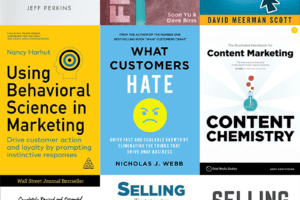Episode 27 of The Verblio Show
It’s not every day you get both a history lesson on manufacturing theory and a window into the future world of influencer marketing all in a single conversation.
Niel Robertson is special, though, and in this episode he and Steve cover everything from the discretization of labor in the 1800s, to the future of advertising, to where the gig economy is headed next. As a “parallel entrepreneur,” Niel also shares insights he brought to his latest venture Influence.co to turn it into the largest networking platform for influencers on the web, and reveals how it’s given him a firsthand look at the fundamental transformation happening in personalizing advertising right now.
Guest-at-a-Glance
Name: Niel Robertson
What he does: Co-founder and CEO of Influence.co, a professional community connecting influencers, creators and businesses.
Find Niel on the web: Influence.co | LinkedIn | Twitter
Get smart: “The single smartest question you can ask when you talk to someone is, ‘Who else should I meet?’”
Top Tips from This Episode
Influencer marketing is standing traditional advertising on its head
Forget Omaha as the ideal test market because it’s the average demographic of everyone you’re trying to reach. What influencer marketing allows you to do is the exact inverse: “Influencer marketing allows you to find all the versions of who you’re trying to reach, very cost affordably, integrated not only into the aesthetic, but to the lifestyle of the person,” Niel explains.
In the same way that content has gotten more personalized, advertising is following the same trend. Instead of a single campaign that displays a product in the same context whether it’s on a billboard in NYC or in a mall in Texas, you can now have your product contextualized into hundreds of different situations. It’s essentially crowdsourcing your advertising, or “lifesourcing,” as Niel calls it. “It’s like taking as many people’s lives as possible and getting that value applied to your brand.”
Understand the implications of your business model
Niel broke down exactly what went wrong for one of his earlier businesses, a marketplace called Trada that connected SMBs with AdWords professionals. “Unknowingly, we put ourselves in the middle of the relationship between the business and the AdWords expert,” he says. As a result, Trada was operating as an agency instead of a pure SaaS business, and that changes the calculus when it comes to funding and investment.
“The model ended up being what I would call a technology-enabled services business, which ends up being a really high-margin agency. Which as a stand-alone business is great—every agency would love to have 40 percent margins. But as a venture-backed business, you end up not looking like a technology-enabled services business—you end up looking like a very low-margin SaaS business. So, you’re a SaaS company that has 40 percent margins, when you should have 80 or 85 percent margins, and you just can’t get continual funding for that model.”
The takeaway? Business success isn’t just about the idea or even the resulting product. Understand the ecosystem, know where your model fits into it, and design your economics—whether you’re bootstrapped or venture-backed—accordingly.
Learn to identify patterns
As an entrepreneur with several irons in the fire at any given time, how does Niel know which ideas are worth pursuing? “A lot of it is just pattern matching, pattern matching, pattern matching,” he says. “You see patterns, you learn what you can copy, you learn where landmines are.”
Recognizing patterns also requires objectivity. For Niel, that means “falling out of love with your ideas as fast as you can.” If you can reach a point where you can “throw away 99 percent of your ideas unemotionally and very easily,” you’ll be left with the ones with the highest likelihood of success.
Episode Highlights
History lesson: How the discretization of work began…
“Bethlehem Steel at the end of the Spanish War had a ton of steel sitting on the ground that they didn’t know what to do with, and they couldn’t figure out how to get their workers to cost-effectively put it all on railcars and ship it away.
And so they hired this guy, Frederick Winslow Taylor, who came in with this whole new concept of managing people, which was based on paying them for the work that they did. And he would discretize the amount of—it was called pig iron—the amount of pig iron that they could lift per day onto a railway car and he paid them in units of weight, essentially. And through this system, he was able to cost-effectively get all the iron onto the railway cars and keep Bethlehem Steel from going out of business.
The concept caught on and it was called Taylorism. And it was essentially the first approach to discretizing work and paying people on units of work.”
…and how it’s shifting today
“5 or 10 years ago the gig economy would maybe be defined as small chunks of work or activity, whether it’s writing a 250-word blog post for someone or taking someone from point a to point b in a car…that had a marketplace be the supplier of those jobs so you could sort of pastiche together a bunch of jobs to make enough income to do that for a living. And really, it was about flexibility of work, and quality of work getting you access to more jobs.
…The trend that I’ve seen is that there’s a bit of fatigue that you get from always trying to get new gigs…and so I think those marketplaces have tended to gravitate towards bigger longer contracts for things—more stability for the worker, more consistency with the business user.”
Building a moat takes time, but it’s worth it
“You can’t hand Google a million pages and be like, ‘Please index these and put them all at number one.’ You have to be very slow and methodical about it. It took us three years of developing this SEO strategy and going through all sorts of Google updates and changes and trying to be very good SEO citizens, to get to a point where we have a pretty defensible moat. If someone decided to come compete with us tomorrow, they just couldn’t. It would take them a couple years to earn their way into it.”
Money can’t buy everything
“You have to play a longer game because you have to design a system that eventually gets everybody to sign up for it. ‘Cause it doesn’t work if you have 2% of the influencers—you have to have all the influencers. And so to do that, you can’t buy your way to getting everybody to sign up. So you have to think about how to create organic strategies.”
Don’t get attached to your ideas
“I think of something, get mentally engaged in it, and then try to set it aside for a week or two. And if I don’t think about it anymore, I don’t ever go back to it. It’s the ones that nag at you, gnaw at you—you find yourself up at two in the morning—that are the ones that end up usually getting started.”
Learn from the ‘despites’
“I read a book once called What Got You Here Won’t Get You There, and it can be very simply summarized as, you have success despite a lot of things. But when you have success, you don’t think of the despites—you think of the whys. And the hurdle you have to overcome on your next thing is the despites. And so people forget there were despites, and they jump into things. And those despites, when you play the game again, come back to be much heavier weights around your ankles.”
Top quotes
Niel:
[2:11] “I like ‘the passion economy’ because who am I to say what oughta interest people? As long as they can make money doing it in the way they want, that’s great.”
[11:24] “I think the trend has been towards less discretization, more bigger projects and longer-term relationships. But still a sense that you can come and go as you please and that you’re getting valued based on your output, not based on an hourly rate—or there’s some kicker in there whether it’s a tip or delivery fee or something that values your performance, not just your presence.”
[14:34] “When you put yourself in the middle, you end up being an agency whether you like it or not.”
[29:45] “[Advertising] is being completely reinvented now. Like, forget access to the audience, forget performance marketing—what the actual ad itself is, is going through a massive transformation.
[32:24] “The smartest thing that any entrepreneur could do is probably invest in five startup companies and stay as close to them as the CEO’s will let them.”
[38:17] “The professor said, ‘What’s the best way to answer a question?’ and all these MIT kids are sitting there, thinking very hard about that, and he said, ‘Just ask someone who already knows the answer.’”
[39:42] “The single smartest question you can ask when you talk to someone is, ‘Who else should I meet?’”
Learn More
Check out Niel’s talk at the first Tedx conference in Bouder ten years ago, where he discussed Taylorism and the future of work.
Niel references Marshall Goldsmith’s What Got you Here Won’t Get You There, a best-selling business classic.



